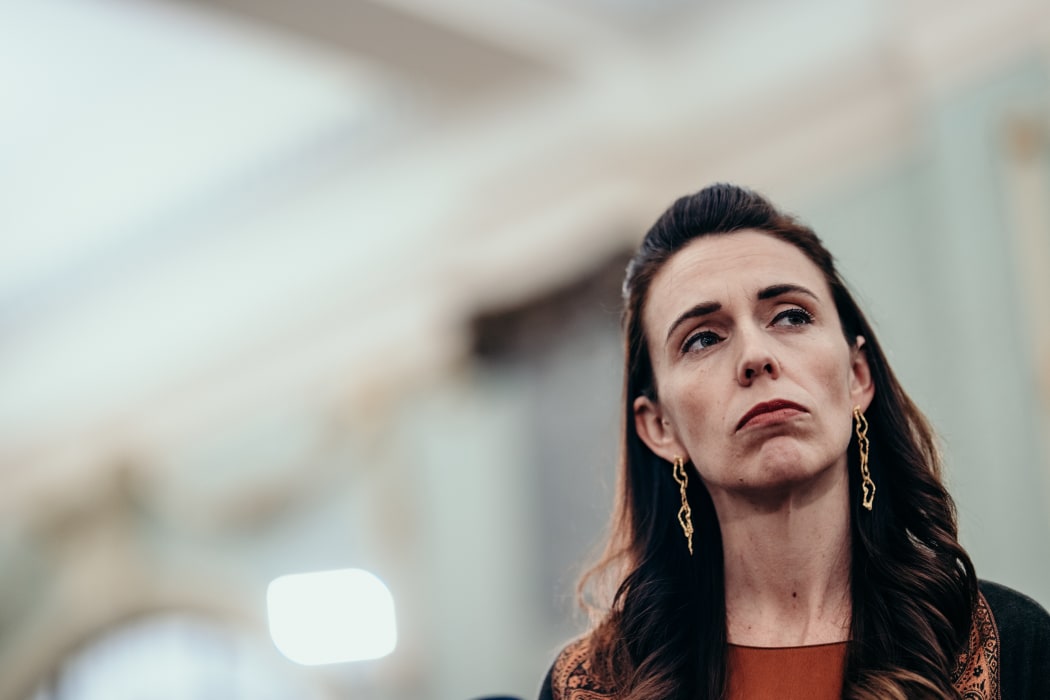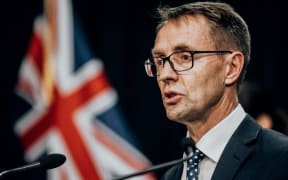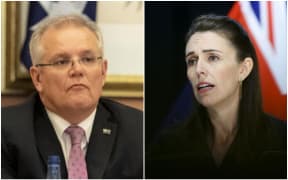By Peter Wilson*
The Week In Politics: The government orders a three-day lockdown to deal with another Covid-19 outbreak but border security is again under scrutiny and the opposition isn't happy. Prime Minister Jacinda Ardern accuses Australia of acting in bad faith as she handles a tricky trans-Tasman problem.

Prime Minister Jacinda Ardern Photo: RNZ / Dom Thomas
Prime Minister Jacinda Ardern's week began dramatically on Sunday when she announced a Covid-19 outbreak in the South Auckland suburb of Papatoetoe and put the city into a Level 3 lockdown, with the rest of the country moving up to Level 2.
Three members of a family had tested positive. The man was a self-employed tradie, the woman worked for a company that provided food and laundry services for airlines and the 13-year-old girl was a student at Papatoetoe High School.
Contact tracing and testing swung into action. By Wednesday, when the raised alert levels were due to be brought down, there had been three more cases all linked to the first three.
Cabinet decided to take Auckland down to Level 2 and the rest of the country went back to Level 1, with the tweak that masks have to be worn on public transport.
When that decision was made there were still test results outstanding on some of the students at Papatoetoe High but the cabinet, and Director-General of Health Dr Ashley Bloomfield, were confident it was a single chain of transmission.
Ardern said it could be managed, and brought to an end the shortest New Zealand lockdown since the pandemic began.
There's been a significant shift in the government's response strategy as it gains confidence in testing and contact tracing systems, and that was reflected in Wednesday's decision.
In the beginning, contact tracing was new, the people doing it had no previous experience, and initially there weren't nearly enough of them. It is tuned up now and Stuff quoted economist and modeller Rodney Jones as saying "we have a Ferrari in our system in terms of chasing down these clusters".
Not everyone felt that way, and in Parliament on Tuesday the opposition wasn't happy. ACT leader David Seymour called for an urgent debate and it was granted.
He accused the government of being high on self-congratulation. "Even while the city of Auckland was locked down in Level 3, the rest of the country operating at Level 2, the government triumphantly announced it had landed enough vaccine for 30,000 people - that's enough for 0.6 percent of the team of five million," he said.
Seymour criticised the government for the way it developed its Covid-19 response. "Instead of continuous improvement we have sat still. A sitting duck, praying for luck while the government congratulated itself for months on end."
Covid-19 response Minister Chris Hipkins accepted none of that. "What we've seen throughout our Covid-19 response is that we do have a system focused on continuous improvement, a system that is focused on learning from our experiences," he said.
"When a weakness is identified, we fix that weakness."
Hipkins said New Zealand had one of the most successful responses in the world, one of the lowest number of cases per capita, one of the highest rates of testing and one of the lowest mortality rates.
Seymour interjected "do a little dance", treating Hipkins' statistics as the sort of self-congratulation he had earlier complained about.
The debate set out very well the attitudes of the parties to the pandemic and opposition concerns about the way it is being handled. The Hansard report is on Parliament's website.
Question time throughout the week was dominated by the outbreak. In the House and outside it, there were calls for mandatory testing at the border to be stepped up and widened to include thousands of indirect workers such as the woman who worked for the servicing company.
Attention was also focused on saliva testing, a much easier way of checking for Covid-19 which could be used for daily testing.
Answering questions from National leader Judith Collins Ardern said saliva testing was being used in high-risk areas such as quarantine centres alongside the nasal swab test. It wasn't as accurate as the nasal swab, and results sat alongside each other.
This issue continued to be discussed during the week, with the opposition wanting to know why it wasn't widely used. Dr Ashley Bloomfield, the Director-General of Health, said data was being gathered by using it in tandem with the nasal swab test. He wants to know more about its accuracy before using it for diagnosis.
Two leading public health experts, professors Michael Baker and Nick Wilson, said saliva testing should be stepped up.
"The data I've seen suggests it may be, just may be, as reliable (as nasal swabs) but even if it is less reliable, because it is being done every day it's probably far superior to just weekly testing… and it's much less onerous on staff," Wilson said.
While this was going on Ardern was faced with an entirely different problem. Reports from Turkey said a New Zealand citizen had been arrested at the Turkish-Syrian border. She was considered to be a terrorist.
As the media delved into this it was discovered that the woman had been born in New Zealand and left with her family for Australia when she was six. She became a dual citizen, and left Melbourne some years ago to join ISIS in Syria.
The ABC named her as Suhayra Aden, aged 26. She has two young children with her.
But she is no longer an Australian citizen. She was stripped of that, leaving New Zealand responsible for her future.
Ardern reacted angrily, accusing Australia of abdicating its responsibility and acting in bad faith. She had not known the woman had been stripped of Australian citizenship.
"You can imagine my response… New Zealand is frankly tired of having Australia export its problems," she said.
Australian Prime Minister Scott Morrison was quoted by the ABC as saying laws passed in Australia automatically cancelled the citizenship of a dual citizen "when they've been engaged in terrorist activities… that has been a known part of Australian law for some time."
Read the details in RNZ's Power Play - Trans-Tasman row over terror suspect deepens.
Ardern then discussed the situation with Morrison by phone, and they both decided to cool it down. A spokesman for Ardern said their talk had been constructive. "Regardless of the steps taken in this case to date, both New Zealand and Australia acknowledge that this case now has a number of complexities. We are working through those issues in the spirit of our relationship."
Andrew Little, the minister responsible for the security agencies, told RNZ the woman's family had been in contact with New Zealand authorities. "There's a way to go to sort out what actually happens next," he said.
National's Judith Collins said Australia's move to strip the woman of her citizenship obviously caught New Zealand by surprise.
She hoped it could be resolved. "I don't think many New Zealanders would think that much, or worry that much, about the woman herself… but there are two innocent children who unfortunately do need to have someone looking after them and do need a place of safety."
The woman is detained in Turkey. If Turkish authorities deport her, the only place they can send her is here. Turkey says co-ordination with New Zealand is continuing.
*Peter Wilson is a life member of Parliament's press gallery, 22 years as NZPA's political editor and seven as parliamentary bureau chief for NZ Newswire





